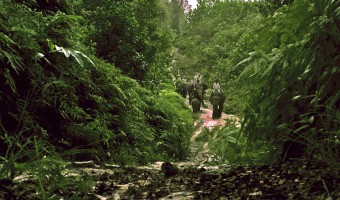
LESSON SUMMARY
Students will use the stories in episode 1 to better understand fact and opinion while engaging in argument, discussion, and writing to hone these critical skills.
LEARNING OBJECTIVES
- Students will strengthen their ability to discern fact from opinion in a time of mass media.
- Differentiate between evidence that is strong and evidence that is weak.
- Evaluate the strength of specific evidence related to environmental issues.
TEACHER BACKGROUND
Argument – evidence – claims – credible sources – all skills that students need to discern the world around them. As students engage in the stories, they will have to negotiate their understanding which will require learners to construct a richer version of the concept, in this case, climate change, and transform their understanding from where they originally started.
Traditionally, science laboratory activities are structured around the laboratory report format. Students are expected to engage in a format the outlines the hypothesis, procedures, observations, results, and discussion. Unfortunately, this format is typically used by scientists only to report their work to journals for publication. This is not what occurs in science laboratories. Scientists are involved in posing questions, making claims, providing evidence, debating with each other, comparing their answers with others in the field, and attempting to look for patterns across their results. Scientific argument is at the very core of science activity. Having completed this process of argumentation, scientists then prepare their written reports for publication. Questions, Claims and Evidence, 2008
According to Meier, Hand, Hockenberry, and Wise, it is important to remember that the learner controls learning and it is up to you, the classroom teacher, to orchestrate opportunities where students can share and expand their developing understandings.
Lesson Videos
Lessons
Stories HS-1: Last Stand, Pray for Rain, Climate Wars
In “Last Stand,” YEARS correspondent Harrison Ford travels to Indonesia to investigate deforestation caused by the palm oil industry. In “Pray for Rain,” Don Cheadle visits Plainview and finds that most people blame the drought on the will of God or say it’s part of a natural cycle. In “Climate Wars,” Thomas Friedman witnesses climate change as a “threat multiplier” in three Middle Eastern countries: Egypt, Syria and Yemen.
Materials HS-1

Before you begin, make sure you have the following materials. You will need copies of the handouts for each student and a projector for the PowerPoint. Each handout is available in its original format or as a PDF file: Evidence Organizer, Fact/Opinion Sorter, Fact/Opinion Presentation. Students should have their science notebooks.
Vocabulary HS-1

Carbon cycle, carbon sinks, climate, climate change, corruption, credible, deforestation, distribution, drought, equal and just, evidence, deforestation, emissions, fact, greenhouse gases, Green Peace, interconnectedness, impact, local v. global, natural cycle, opinion, peat, religion, scarcity, science, sequester, trend line, want versus need, weather
Prerequisite Knowledge HS-1
Length: 15 minutes

Before beginning, assess your students’ prior knowledge around events and issues presented in the lesson and in episode 1.
Engage HS-1
Length: 20 minutes

Ask students about forensics shows on TV.
- What are some facts the investigators might collect?
- What are some opinions the investigators might run in to?
- What kinds of evidence are used to prove a case?
- What kinds of evidence are the most credible?
- How are credible sources determined?
- What types of primary and secondary sources are utilized in an efforts to solve the case?
Explore HS-1
Length: 45 minutes

In groups of 3-4 ask students to create their own argument and provide 4-5 pieces of supporting evidence. You may wish to assign each group with a type, strong, medium, or weak. Allow each group to share their argument and evidence with the class. The class, as a whole, should be able to classify each group’s argument and evidence as either strong, medium, or weak.
Explain HS-1
Length: 55 minutes

If time allows watch episode 1 in its entirety and then come back to the specific segments highlighted below. Have students work in small groups to answer the questions. Students need to record their answers in their science notebooks. You may want to show all clips in one day or separate them into two days. *Important Note* Provide students with these questions prior to viewing.
Elaborate HS-1
Length: 20 minutes

You will provide students with a statement to which they will either agree or disagree. Assign a side of the room that will represent “agree” and a side of the room that will represent “disagree”. Explain there is no middle ground, thus the title – Take a Stand.
Evaluate HS-1
Length: 15 minutes

The interactive online quiz provides instant feedback about your knowledge of this subject. The justified true/false questions are meant for use in the classrooms.
Taking Actions and Designing Solutions HS-1

Taking actions and/or designing solutions to our local, national, and global problems are a personal journey. Via Facebook and Twitter (#YEARSproject), share how you are taking action to combat climate change or if you’ve designed potential solutions share those on Instagram or make a Vine.
Writer’s Corner HS-1

Without language there is no science. To be practicing scientists and derive new knowledge, we need language – reading, writing, talking, listening, enacting, and visualizing. Writing is one way to communicate understanding of our learning while allowing us to be creative in our delivery and provide insight and possible solutions to problems.
Agents of Change HS-1

Katharine Hayhoe studies climate change, one of the most pressing issues facing the planet today. An expert reviewer for the Nobel Peace Prize-winning Intergovernmental Panel on Climate Change, her life’s work has been dedicated to discovering and communicating the realities of a changing climate to those who will be affected most by it.
Careers HS-1

Inspired by Episode 1? Thinking about your future? You have the power to make a difference today and in the future. Look into careers inspired by the issues presented in Episode 1: Dry Season.
Resources and Links HS-1

Use the following print and online resources to supplement your understanding of the material covered in this lesson.
Standards HS-1

Download the standards tables for High School Lesson 1: NGSS, CCSS, and NCSS. You can also read the different standards applicable to High School Lesson 1 here.
PDF Lesson Plan HS-1

Download and print the lesson plan in PDF format.

